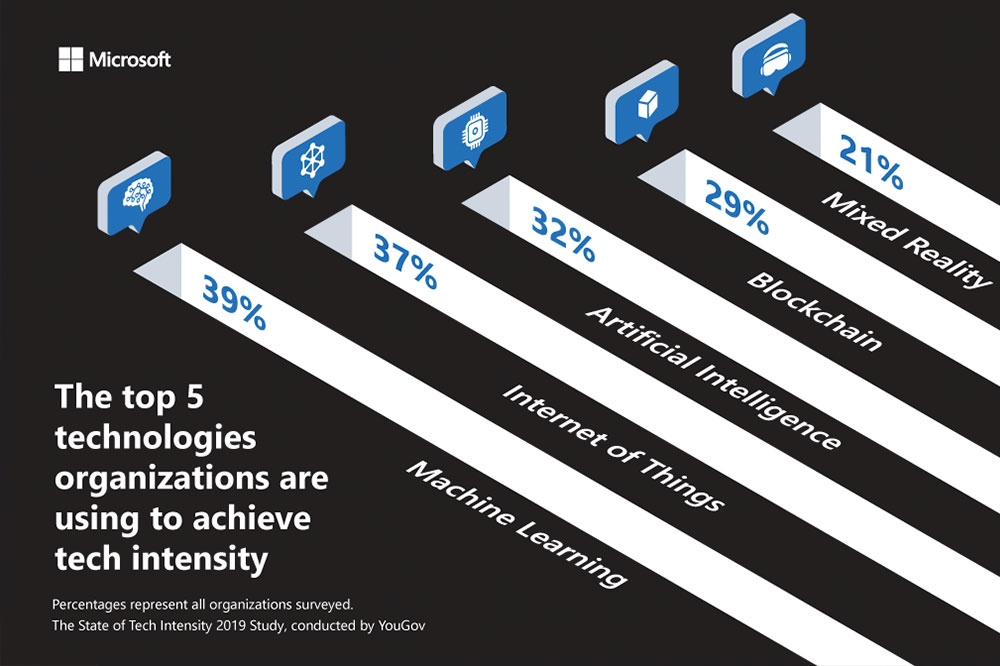Whether you’re a car manufacturer, publishing house or retailer, technology is completely transforming industries and companies are having to adapt. Now, rather than being ‘just’ a car manufacturer, companies of all industries have to also be technology companies, and it’s something that IT decision makers all understand, according to a Microsoft survey.
In order to succeed, companies are having to build their own technology leveraging tools that are available on the general marketplace, such as machine learning, the Internet of Things and artificial intelligence. Microsoft’s survey found that more than ever, companies are developing their own solutions to give them a competitive advantage, rather than solely relying on off-the-shelf solutions.
“Up until now, organisations have looked to technology companies like Microsoft to provide digital tools for improving efficiency, increasing productivity and driving innovation,” said Deb Cupp, corporate vice president, Worldwide Enterprise and Commercial Industries, Microsoft.
“Now, the organisations achieving the greatest success are applying these tools and technologies to invent their own digital solutions to solve complex business and societal issues. In the process, they’re essentially becoming technology companies themselves as they drive progress and innovation in their industries. We refer to this approach as ‘tech intensity,’ and we strongly believe it is what will determine an organisation’s future success.”
One of the key findings of the study was the extent to which companies have embraced tech intensity. According to the study, tech intensity is already pervasive, with 73% of companies reporting they are currently creating their own first-party intellectual property using next-generation technologies such as machine learning (39%), IoT (37%), AI (32%), blockchain (29%) and mixed reality (21%).
The study also revealed broad agreement across industries that tech intensity is critical for current and future success. For example, 75% of respondents believe that harnessing tech intensity is the most effective way to build competitive advantage today, and 75% also believe it will be crucial to building competitive advantage in the future.
In addition to creating competitive advantage now and into the future, responses also revealed a strong belief that tech intensity will be a catalyst for ongoing disruption. Nearly half of those surveyed predict that existing companies will be forced to compete with new entrants in their industry that are building their own digital capabilities and intellectual property. Among the industries where that expectation is the highest are media and communications, financial services, retail, and automotive.
Global impact of tech intensity
Although much of the focus of tech intensity is on creating competitive business advantage, there was a strong consensus that tech intensity will have a positive impact on global communities. When asked about specific areas where tech intensity will serve as a driving force for societal improvement, 43% selected better public services at lower costs, 40% chose improved connectivity in rural areas, and 40% chose reduced corporate waste. Other key areas where respondents expect to see improvements include health care (36%), consumer safety (36%), worker safety (33%) and access to financial services (33%). Only 8% said they don’t expect tech intensity to deliver any positive benefits for global communities.
In addition, while 47% of those surveyed said they believe richer, more connected and more digitally sophisticated countries will see GDP grow at a faster rate, 36% expressed confidence that tech intensity will actually make the global economic playing field more level. At the same time, only 19% of respondents said they expect that tech intensity will have a negative impact on economic growth in less wealthy, less connected and less digitally sophisticated countries.
Tech intensity and corporate culture
Another key finding of the study was the effect of tech intensity on organisational culture. For example, there is a nearly unanimous belief that staying on the cutting edge of technological progress is essential to retaining talent, with 92% of those surveyed agreeing it is important or very important to work for an organisation that keeps up with software and application trends. That belief is particularly strong among millennials, only 2% of whom think that staying current with technology isn’t important. In contrast, 9% of Gen Xers and 10% of baby boomers don’t think that keeping up with technology is important.


